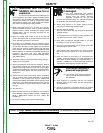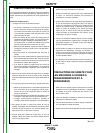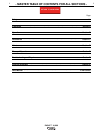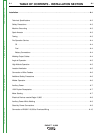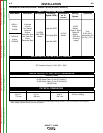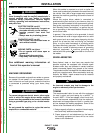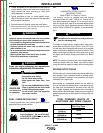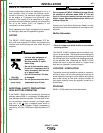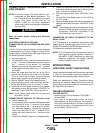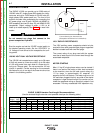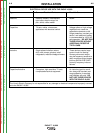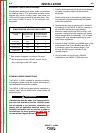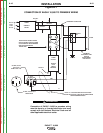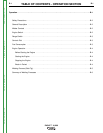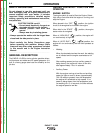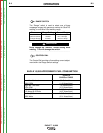
INSTALLATION
A-6 A-6
EAGLE™ 10,000
EAGLE 10,000
Constant Current 210 Amps DC @ 25 Volts
CONNECTION OF LINCOLN ELECTRIC
WIRE FEEDERS
NOTE: A constant voltage (CV) power source is rec-
ommended for wire feeder applications. The
LN-15 and LN-25 may be used with a constant
current (CC) power source, such as the
EAGLE 10,000, for non-critical applications
where weld quality and deposition properties
are not critical.
Shut off welder before making any electrical
connections.
------------------------------------------------------------------------
WIRE FEED (CONSTANT VOLTAGE)
CONNECTION OF LN-15 ACROSS-THE-ARC WIRE
FEEDER
The LN-15 has an internal contactor and the electrode
is not energized until the gun trigger is closed. When
the gun trigger is closed the wire will begin to feed and
the welding process is started.
a. Shut the welder off.
b. For electrode Positive, connect the electrode cable
to the "+" terminal of the welder and work cable to
the "-" terminal of the welder. For electrode
Negative, connect the electrode cable "-" terminal
of the welder and work cable to the "+" terminal of
the welder.
c. Attach the single lead from the front of the LN-15
to work using the spring clip at the end of the lead.
This is a control lead to supply current to the wire
feeder motor; it does not carry welding current.
d. Set the “RANGE” switch to a suitable position.
e. Place the Engine switch in the “Auto Idle” position.
f. Set the Welding Mode on the LN-15 to the “CC” mode.
g. Adjust the wire feed speed at the LN-15 and adjust
the welding current with the output “CONTROL” at
the welder.
Output “CONTROL” must be set above 3.
Note: LN-15 Control Cable model will not work with
the EAGLE 10,000.
CONNECTION OF THE LN-25 TO THE
EAGLE 10,000
a. Shut the welder off.
b. For electrode Positive, connect the electrode cable
from the LN-25 to the "+" terminal of the welder
and work cable to the "-" terminal of the welder.
For electrode Negative, connect the electrode
cable from the LN-25 to the "-" terminal of the
welder and work cable to the "+" terminal of the
welder.
c. Position the “RANGE” switch to a suitable position.
d. Attach the single lead from the LN-25 control box
to the work using the spring clip on the end of the
lead - it carries no welding current.
e. Place the engine switch in the “AUTO IDLE” posi-
tion.
f. Set the Wire Feed Mode switch on the LN-25 to
the “CC” mode.
g. Adjust wire feed speed at the LN-25 and adjust the
welding current with the output “CONTROL” at the
welder.
NOTE: The welding electrode is energized at all times,
unless an LN-25 with built-in contactor is used.
If the output “CONTROL” is set below “3”, the
LN-25 contactor may not pull in.
CONNECTION OF K930-2 TIG MODULE TO THE
EAGLE 10,000.
The TIG Module is an accessory that provides high
frequency and shielding gas control for AC and DC
GTAW (TIG) welding. See IM528 supplied with the
TIG Module for installation instructions.
NOTE: The TIG Module does not require the use of a
high frequency bypass capacitor. However, if
the EAGLE 10,000 is used with any other high
frequency equipment, the bypass capacitor
must be installed, order kit T12246.
INSTRUCTIONS
ADDITIONAL SAFETY PRECAUTIONS
Always operate the welder with the roof and case sides
in place as this provides maximum protection from
moving parts and assures proper cooling air flow.
Read and understand all Safety Precautions before
operating this machine. Always follow these and any
other safety procedures included in this manual and in
the Engine Owner’s Manual.
WELDER OPERATION
WELDER OUTPUT
• Maximum Open Circuit Voltage at 3700 RPM is
80 Volts RMS.
• Duty Cycle is the percentage of time the load is
being applied in a 10 minute period. For example, a
60% duty cycle represents 6 minutes of load and 4
minutes of no load in a 10 minute period. Duty Cycle
for the EAGLE 10,000 is 100%.
WARNING
Return to Section TOC Return to Section TOC Return to Section TOC Return to Section TOC
Return to Master TOC Return to Master TOC Return to Master TOC Return to Master TOC



